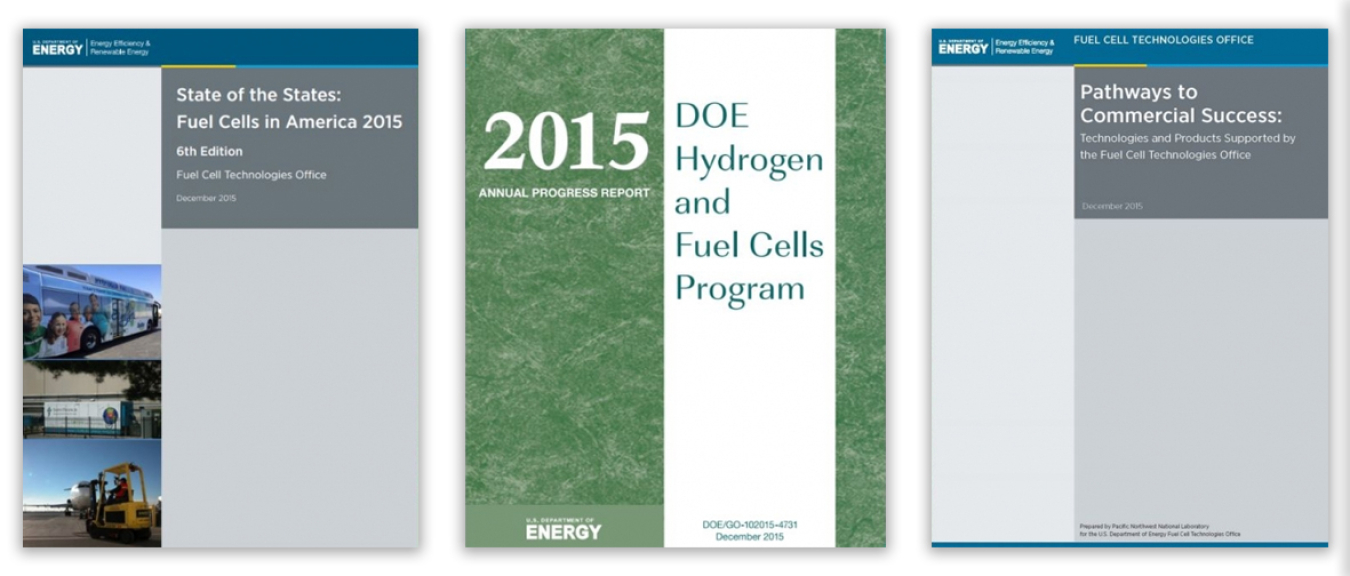The three reports released by the Energy Department highlight continued strength, progress and innovation in the U.S. fuel cell hydrogen technologies
Office of Energy Efficiency & Renewable Energy
December 22, 2015
The three reports released by the Energy Department highlight continued strength, progress and innovation in the U.S. fuel cell hydrogen technologies market.
The Energy Department released three new reports today showcasing strong growth across the U.S. fuel cell and hydrogen technologies market – continuing America’s leadership in clean energy innovation and providing U.S. businesses and consumers more affordable, cleaner transportation and power options. According to these reports, the United States continues to be one of the world’s largest and fastest growing markets for fuel cell and hydrogen technologies.
With support from the Energy Department, its national laboratories and private industry have already achieved significant advances in fuel cell and hydrogen technologies – reducing costs and improving performance. These research and development efforts have helped reduce automotive fuel cell costs by more than 50 percent since 2006 and by more than 30 percent since 2008. At the same time, fuel cell durability has quadrupled and the amount of expensive platinum needed in fuel cells has decreased by 80 percent in the last decade.
Building on this progress, earlier this month the Energy Department announced more than $35 million to advance hydrogen and fuel cell technologies. The available funding includes hydrogen production, delivery, and storage research and development (R&D); demonstration of infrastructure component manufacturing, and support for Climate Action Champions deploying hydrogen and fuel cell technologies; consortia topics for fuel cell performance and durability and advanced hydrogen storage materials research; and cost and performance analysis for hydrogen production, storage, and fuel cells.
The three Energy Department reports issued today detail continued strength in the U.S. fuel cell and hydrogen technologies market as well as efforts by U.S. businesses and states to increase American competitiveness in this growing global industry.
State of the States Report
Today the Energy Department issued the State of the States, Fuel Cells in America 2015 report, highlighting leadership among U.S. states to grow domestic fuel cell manufacturing and deployment. The report recognizes California, Connecticut, and New York for leading the country with continued and expanded support for fuel cell and hydrogen technologies – helping to reduce emissions, improve energy efficiency, and create new job and business opportunities. The report also highlights efforts in Colorado, Hawaii, New Jersey, and Ohio as rising stars in the hydrogen and fuel cell industry.
Across the United States, a number of businesses are also driving continued U.S. leadership in the fuel cell industry. Nearly 10 percent of Fortune 500 companies use fuel cells to generate clean, efficient, and reliable power. When examining the top 100 companies on the Fortune list, the number grows – with almost 25 percent using fuel cells to power data centers, cell phone towers, corporate buildings, retail facilities, or forklifts. Familiar customers include companies such as Apple, AT&T, Verizon, Kroger, JPMorgan Chase, Google, Bank of America, Kaiser Permanente, Target, and Lowe’s. Walmart is the largest fuel cell customer for material handling equipment (MHE), deploying the technology to power more than 2,800 forklifts at warehouses in Ohio, Pennsylvania, New York, Illinois, Indiana and Minnesota, with more sites on the way. Over the last few years, AT&T has deployed fuel cells to provide primary power to almost two dozen data and call centers, as well as backup power to hundreds of cell phone towers in multiple states.
Annual Progress Report
The 2015 Hydrogen and Fuel Cells Annual Progress Report documents more than 1,000 pages of accomplishments achieved by Energy Department-funded projects in the last year. The report highlights major programmatic achievements, including:
- launching the $1 Million H2 Refuel H-Prize;
- demonstrating the world’s first fleet of hydrogen fuel cell airport ground support equipment;
- establishing national laboratory-led consortia in key R&D areas;
- and supporting the public-private partnership, H2USA, through national-lab led efforts developing financial assessment tools for hydrogen infrastructure and critical equipment to validate the performance of hydrogen stations as they come on line.
Each individual project team provides a summary of their annual progress.
Pathways to Commercial Success
According to the third report, Pathways to Commercial Success: Technologies and Products Supported by the Fuel Cell Technologies Office, the Energy Department's fuel cell research and development efforts over the last decade have helped develop 40 commercial technologies and 65 new technologies that are expected to reach commercial-scale within the next three to five years. In addition, Energy Department fuel cell R&D has resulted in more than 515 U.S. patents.
Find more information on these three new fuel cell and hydrogen reports.
Sunita Satyapal

Sunita Satyapal is the Director for the U.S. Department of Energy's (DOE's) Hydrogen and Fuel Cell Technologies Office and coordinates activities across offices for the U.S. DOE Hydrogen Program. She is responsible for more than $1.6 billion in hydrogen and fuel cell research, development, demonstration, and deployment (RDD&D) activities within the office and for coordinating more than $9.5 billion in hydrogen activities across DOE. In addition, she led the development of the national clean hydrogen strategy and roadmap and serves as the Director for the Hydrogen Interagency Taskforce, which includes a dozen agencies and is co-chaired by the Deputy Secretary of Energy and the White House Deputy National Climate Advisor. She has more than two and a half decades of experience across industry, academia, and government, including at United Technologies managing RDD&D and business development, and as a visiting professor.
Sunita also coordinates international hydrogen activities as Vice-Chair of the International Partnership for Hydrogen and Fuel Cells in the Economy, a partnership among over 25 countries to accelerate progress in hydrogen and is the U.S. co-lead for hydrogen efforts within the Clean Energy Ministerial and Mission Innovation. She received her Ph.D. from Columbia University and did postdoctoral work in Applied and Engineering Physics at Cornell University. She has numerous publications, including in Scientific American, 10 patents, and several recognitions including a Meritorious Presidential Rank Award in 2015, a Distinguished Presidential Rank Award in 2022, and selected as an Ambassador for C3E, the Clean Energy Education & Empowerment Initiative, to advance the leadership of women in clean energy.

